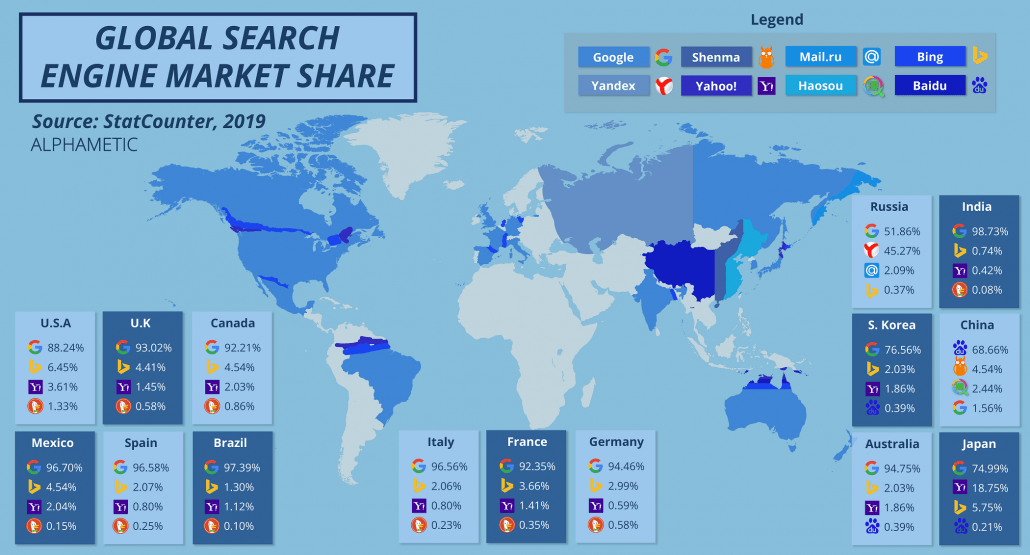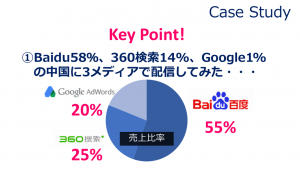Our current topic is paid search in China, which is a topic nowadays marketers cannot overlook. Every marketer knows that Baidu boasts an overwhelming 71.13% search share in China. The remaining portion is held, in decreasing order, by Sogou, Haosou, and Google.

https://alphametic.com/global-search-engine-market-share
The Increasing Power of Sogou and Haosou
In the past few years, the influence and search share in China held by Sogou and Haosou have been on the rise, and there is a strong likelihood that Baidu’s numbers will shrink to below these two engines’ in the future.
Haosou, currently moving toward a 3.68% share, was originally known as 360 Search, but has since rebranded itself. It started out as a PC security software company, so its users have high internet literacy, and as a result the company’s share among B to B users is rising sharply.
We also recommend paid search on Sogou, whose share has been creeping up over the last few years.
Paid Search Must Take Local Elements into Account
Within China, many areas remain without Internet or with poor connection, so paid search marketing in those areas is taking some time to grow.
Even if you fork out the cost to market in these areas, because of internet speed issues, web traffic will likely bounce and your costs will continue to mount.
On the messaging side, although there are no real differences in terms of what appeals in China at the basic level, the value props that really strike consumers are different.
For example, in Japan, where we are located, business schools will bring in customers from overseas through appealing to them based on factors such as their MBA, but in China, people often will search based on cost which is many times the major deciding factor, so for those advertisers who include scholarship-related content in their ads, they may see better click through rate performance.
It Is Important to Include a Sense of Safety in your Advertising
A major reason that Chinese internet users often choose to use Japanese e-commerce sites to purchase items even though they are available on Chinese domestic sites is that they feel confident that the products bought through the Japanese sites are real.
Therefore, in the context of paid search aimed at China, it is important to include assurances regarding authenticity in your messaging, which will remove anxiety about making purchases across borders.
Also, in order to eliminate concerns about how long delivery will take or how high delivery costs will be, it is effective to include specific language such as “3-day delivery” or “$5 shipping” in your ads.
Chinese Users Value Site Reliability over Cost
It is essential to research the Chinese market before developing a business in China. Always keep in mind the fact that Chinese users have different patterns of behavior.
For example, when buying vacuum cleaners on e-commerce sites, Japanese users typically start by looking up “vacuum cleaner prices” on a search engine or directly entering brand/product names on a site where the products can be cheaply bought.
Chinese users, on the other hand, begin by searching for the product on e-commerce sites such as TMall, then search among those results.
In comparison to Japanese users, they are more likely to buy in one step. One theorized reason for this is that Chinese users attach more importance to a site’s reliability than to a product’s price.
This conclusion is drawn from the fact that they will search directly for a product’s name if they wish to know information about the product, but when they actually make the purchase, they will search on well-known brand’s site.
It seems that Chinese people do not have much confidence in smaller, domestic websites.
First Test the Market on Google
Baidu has a higher search share when users in China search for domestic information, and Baidu supposedly holds roughly a 70% share of the paid search market.
Therefore, many people might think paid search in China should start with Baidu first.
This does not mean that one should only run paid search on Baidu though.
This pie chart shows the traffic share from each search engine when Chinese users made purchases from a Japanese e-commerce site.
The results are as follows: Baidu 55%; 360 Search 25%; Google 20%.
Cross-border e-commerce is a terrific way to solidify your brand awareness in China, as being present on all the platforms is considered a great advertising strategy.
The highly-profitable Chinese cross-border e-commerce market continues to strive in 2020 and is projected to be valued at 12.7 trillion yuan before the year ends.
There are two popular ways of cross-border e-commerce currently in China. One is the “Daigou” method. Daigou, which literally means “buying on behalf of”, involves one or a group of “daigou” to travel outside the country and buy sought-after products. The goods will then be sold on social media sites such as WeChat.
The other one is called the “free trade zones”. Free trade zones require products to be shipped to Chinese warehouses without import taxes. Foreign companies commonly utilize this strategy, as it makes their online selling experience in China more convenient.
Most businesses around the world just know how to run paid search from Google Ads.
It would then be best to get accustomed to the paid search market in China by first posting Chinese-aimed ads on Google, and then, if the results are good, expanding out to Baidu and Haosou
Some might contest this point claiming Google’s share in China is just 3.42%.
However, since China’s population is over 1.4 billion people, about 900 million of whom are Internet users, it is still an enormous market. And, this market will likely keep growing significantly into the future.
Another good reason to begin Chinese paid search with Google Ads is the cost of the ads.
Charges for paid search on Baidu are calculated on a monthly basis, and must be continued for three months, so one cannot stop even if he/she wants to.
But with Google Ads, one may begin budgeting from one dollar a day and stop at any time.
Conclusion: Start Marketing in China via Paid Search
Although it depends on your business’s strategy, you shouldn’t only rely on organic search or social channels as your means of traffic as it can take a long time to establish your position on them.
Instead, consider paid search, which is an effective channel that can shorten your time to earning significant traffic within a few months.
We believe marketers interested in China should first look here.
For help with your digital marketing campaigns in China, contact Info Cubic today. We are a Baidu authorized dealer awarded with the Baidu Top Agency award for three consecutive years.
Featured Photo by Nico Villanueva on Unsplash

